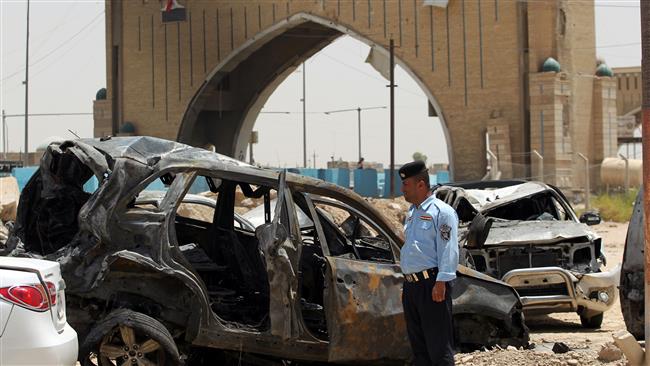

At least 17 people have been killed and scores of others wounded in a bomb attack that struck Kadhimiyah, a Shia district of the Iraqi capital, Baghdad, official sources say.
According to Iraqi police, a bomber detonated his explosives near a security checkpoint at one of the entrances of Kadhimiyah in northern Baghdad on Sunday morning, leaving 17 people, mostly civilians, dead.
Over 20 others were also wounded in the terrorist attack.
The Takfiri Daesh terror group has claimed responsibility for the fatal incident.
Baghdad has seen a dramatic rise in such terror attacks over the past weeks. Most of the assaults were claimed by Daesh terrorists, who mainly target security forces and public places in Shia-populated areas of the capital.
In the deadliest incident, nearly 300 people lost their lives after a bomber detonated an explosives-rigged vehicle at a shopping district in the Iraqi capital’s Karradah neighborhood on July 3. Daesh claimed that assault.
The Karradah bombing is said to be the deadliest to hit the city since the US-led invasion of the country in 2003.

The fresh wave of violence in Baghdad prompted Iraqi Prime Minister Haider al-Abadi to sack a number of high-ranking officials responsible for security in the capital, including the head of the Baghdad Operations Command.
Since 2014, Daesh has swathes of land under control in the northern and western parts of Iraq.
The Iraqi army, backed volunteer fighters, has been engaged in large-scale military operations to liberate the militant-held areas.
They have managed to retake major areas which used to serve as major Daesh bastions in the country, most notably the city of Fallujah in Anbar Province.
The surge in Daesh bomb attacks comes as the terrorists desperately seek to make up for their losses on the battleground.
Earlier this week, Iraqi Defense Minister Khalid al-Obeidi said less than 10 percent of the Iraqi territory remains in the hands of Daesh, calling for better security inside the country as the military continues making gains against the terror group.







